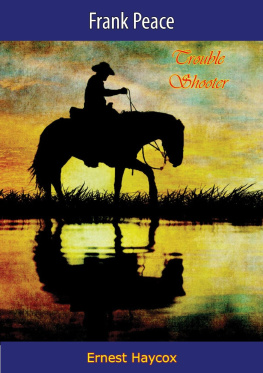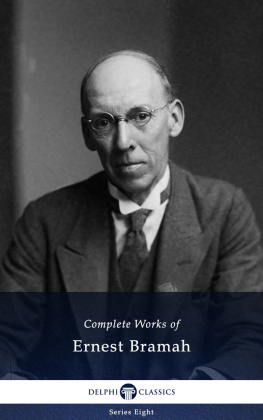This edition is published by BORODINO BOOKS www.pp-publishing.com
To join our mailing list for new titles or for issues with our books borodinobooks@gmail.com
Or on Facebook
Text originally published in 1941 under the same title.
Borodino Books 2017, all rights reserved. No part of this publication may be reproduced, stored in a retrieval system or transmitted by any means, electrical, mechanical or otherwise without the written permission of the copyright holder.
Publishers Note
Although in most cases we have retained the Authors original spelling and grammar to authentically reproduce the work of the Author and the original intent of such material, some additional notes and clarifications have been added for the modern readers benefit.
We have also made every effort to include all maps and illustrations of the original edition the limitations of formatting do not allow of including larger maps, we will upload as many of these maps as possible.
RIM OF THE DESERT
by
ERNEST HAYCOX
THE LAW OF LEAD IN THE WEST
The Broken Bit boys shot Sheriff Ben Borders after the nesters and law-abiders had re-elected him. Old Ben lay dying on the courthouse steps with Jim Keene looking down at him.
You stayin? said Ben.
Ill be staying, said Jim.
Well, when you get to the other side of the hillremember this, sonthe only thing youll find there is just what you brought with you.
Jim Keene had ridden a thousand miles to get to Cloud Valley and away from trouble. He was a strong man and a fighting man, but he always took sides. He couldnt help fighting for the underdog. And when he got to Cloud Valley he found that he couldnt run away from himself.
With the sheriff dead, there was no law. So Jim Keene dealt himself in on the fighton the side of the weakand shot his way to justice
IOLD SIGNALS RISE AGAIN
HE entered town late in the day, stabled his horse at Connoyers and crossed to the hotel: and when he came to register he held the pen motionless awhile, as though the recollection of his full name were an unfamiliar act. On his features, brown-burned by all the years of outdoor life, lay that grave and attentive sereneness of a man long accustomed to his own company, to his own resources and solitary whimsies. He signed, James T. Keene, Dalhart, Texas, in a broad angular hand and waited for the key.
The clerk said hopefully, Long way to come.
Keenes bland Yes closed the clerk out. He took the key and turned to the stairs. Dust silvered his clothes, weather had faded them. His hair lay thick and black and ragged against his temples, there was no mark or scar or shadow of any worry on his face. His mouth was broad below a heavy nose, his eyes were of that shade of gray which is almost blue. Riding had trimmed him, had limbered all his muscles so that his boots made almost no noise on the stairs. At the upper landing he looked back with a sudden flip of his head and caught the clerks following glance, and at that moment his eyes were nearer black than gray, with glass-sharp splinters of interest in them. Thus catching the clerks off-guard curiosity, he was a man hard and fine-drawn by the habits of his life: the next moment he erased that impression with a smile and entered his room.
In this rooms stale warmth every ancient odor of a frontier hotel lay as a musty remembrance. Once there had been crimson roses in the pattern of the shabby carpet. A pine bureau held its pitcher and bowl; there was an iron bedstead whose enamel was chipped by the toweling of countless spurred boots, a rocking chair, and on the wall a lithograph of an old Indian scout belly-flat beside a desert waterhole. Days last clear light came through the single grimed window and through a bullet hole in the wall, autographed by the maker as follows: Ventilated by Smoky Jules from Medora, 1882. Forty-four barrel on a forty-five frame. Never bet aces in another mans game. Some other weary-wise traveler, incited to public comment, had added: Plenty of livestock in this bed. If I was a rustler Id get rich.
It was one more hotel room in one more prairie town, but for Jim Keene it was the first night beneath a roof in sixty days. He stripped to the waist, scrubbed away the dust of long travel, and shaved in a growing twilight. Standing by the window later he had a better view of the town.
The main street was a crooked river of silver dust running from a yellow depot at one end of Prairie City to the out-scatter of sheds and corrals at the other. Keene looked down upon single-story buildings sitting shoulder to shoulder, on board awnings shadowing the street walks, on alleys leading to rear compounds. A wagonload of barbwire rolled past, driven by an obvious homesteader with a square-cut beard. In front of a saloon which advertised itself as the Cattlemans Palace cow ponies stood heads down and half asleep.
There was something wrong with the town; he had caught the smell of that at first entry. He considered the street the saddle shop, the Cattlemans Palace, the grain-and-feed store, the sign which said, Worsham and Ross, Genl Mchdse, the flimsy bank building, the courthouse. He made a picture in his head of it, for to Jim Keene the real world was made up of stray words overheard and the odd change on peoples faces, of prints in the sand and houses sitting empty in the middle of sagebrush, of bullet holes in a hotel wall, of a man enormous in every physical detail standing now in the doorway of the Cattlemans Palace watching the homesteader and his load of barbwire.
The wagon stopped, the homesteader got down and started for the hotel. As he did so the man at the saloona man nearly as tall and as broad as the saloon doormoved into the street. When he passed the homesteader he swerved aside deliberately and his elbow caught the homesteader and knocked him off balance to the dust. The big man walked on, never looking back, but immediately a small crowd of cowhands appeared in front of the saloon, watching this scene with a narrow amusement. The homesteader got up from the dust and stood still, staring at his feet; in a moment he continued on to the hotel, slightly limping.
Jim Keene rolled a cigarette, watching the big man turn back to the punchers gathered at the saloon door. The big man had made his play for the entertainment of the punchers; now he grinned and waggled a hand and the whole group passed into the saloon. Keene lighted the cigarette. He took one deep drag of smoke into his lungs. To his face came the wry tightness of distaste and a feeling, the old feeling over which he had never had any control, ripped through him. He murmured to himself: Always something like that, and went downstairs.
In the dining room he saw the homesteader again. The homesteader was at a corner table with his wife and a grown son and two small children. It appeared to be a holiday for them, a break in the hard work and loneliness of some sagebrush quarter-section a long way from town. They were all cheerful except the man himself, who sat at the head of the table without appetite or interest. Keene thought, He didnt tell them about the knock-down.
Rising from his finished meal. Keene left the dining zoom. He was fed and at ease, his muscles were idle after the long ride and every sound and sensation of this town pleased his hungry senses; yet a cool wind was blowing from his errant past, that wind which governed his life no matter what wisdom his mind might hold. He felt it and regretted it, but nevertheless it pressed softly against him and it made him smile as he crossed to the doorway. In the smile was some regret. In it also, though he never knew this, was a hopeful anticipation.





